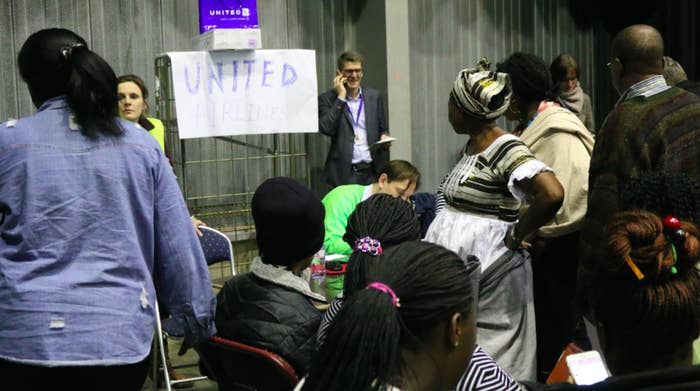
BRUSSELS — Since suicide bombers struck Brussels' main airport on Tuesday, the Brabanthal warehouse, just 23km away, has had the feel of a hectic departures lounge.
People sit clutching printouts of their journey plans. Others huddle around electricity booths charging their phones. Tannoy announcements blare out requests every few minutes for passengers to present themselves at makeshift airline help desks.
They are not sure when they will be able to leave. Hundreds have been stranded at the warehouse for more than 24 hours as they, along with the wider city, try to make sense of the twin attacks that struck Brussels on Tuesday, killing at least 31 people and injuring at least 200 more. All were inside the departures terminal at Brussels airport when the bombers struck.
They had been due to board flights to cities as far afield as New Delhi, Houston, London, and Detroit. Now they sit slumped on chairs scattered across a windowless room, fed by Red Cross staff in high-vis jackets, who hand out bread rolls and orange juice.
Charles Donaldson had been due to board a flight home to Michigan after visiting his girlfriend when the suicide bombers hit.
"I was talking to the manager of a coffee shop, when all of a sudden, I hear this noise. It sounds like a car bumping into another car," Donaldson told BuzzFeed News. He spoke energetically and fast. "I didn't know it was the bomb upstairs going off. Then less than a few minutes later, here comes our explosion, people screamed and ran, and I thought OK, here we go, we're in a war zone."
"When the bomb went off, the ceiling started to come down. I walked through the broken glass with pipes hanging down, the glass walls shattered. I turned around, and I saw the backpack that I think the bomb was in – I knew what it was, it was like a bomb the Boston bomber had. I pointed it out to the officer – I said, 'There is your bomb right there,' and all of a sudden, police yelled, 'Run, go, get out of here.'"
For many in the warehouse, relief at escaping the terror attacks unhurt was being replaced by growing frustration at being stranded with no access to their personal belongings, showers, or information on how long they'd be forced to stay. People had been warned by airlines that they could be forced to stay for the rest of the week if Brussels Airport remained shut. Some began making alternative travel plans to get out of Brussels, paying vast sums for taxis to take them out of Belgium to alternative airports in neighbouring countries.
Yet even as patience grew thin, there were small gestures of camaraderie and support.
"Last night, young mothers with babies, they were crying," Dibdi Shah, a 58-year-old grandmother, told BuzzFeed News. She had been in the airport to board a transit flight from India to her home in the US. "But we told them it's OK. 'We are all here together, why are you so nervous? It will be OK.'"
"We were told to leave everything behind; we have no bags, no medicine," she said. "Some people don't even have their passports – they just ran. We also haven't showered; we don't have any clothes. There's just too many people here now. I really don't think they were prepared for something like this."

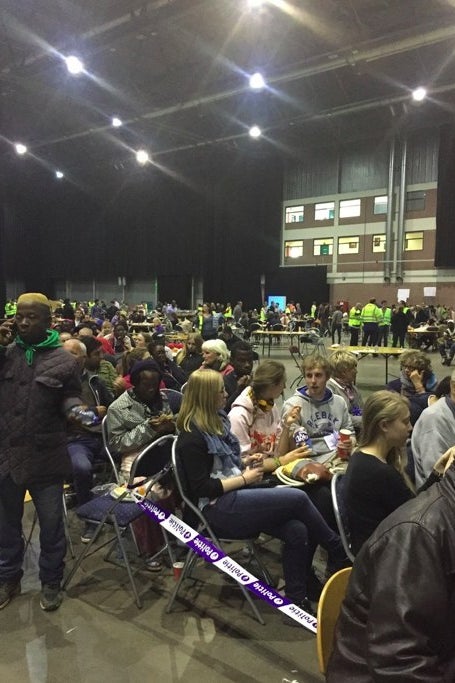
One man was attempting to get home to Delhi to organise the funeral for his father, who had died the week before.
He stood with four other men, who hastily spoke over each other to tell the same problem: they had been passing through Brussels airport in transit, and — since they were Indian passport holders with no Schengen visa — were unable to leave Brussels to catch a flight home from another airport. In effect, they were trapped, and feared that even if they were to try and stay in a hotel nearby, they could feasibly be arrested for not having appropriate visa documents to be on Belgium soil. They also said the airline they were traveling with had explicitly told them that they were "prioritising" US and Canadian travellers as they were "easier to deal with."
"If we try to get another flight, we could be arrested," said the man, who declined to give his name. "We can't go to Frankfurt like the others. I need to go home: I'm his only son. They shouldn't be basing their decisions on who to help here based on nationalities."
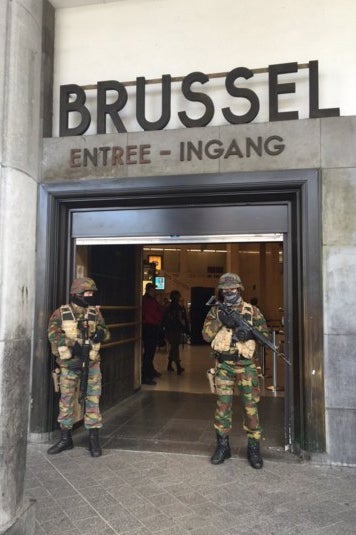
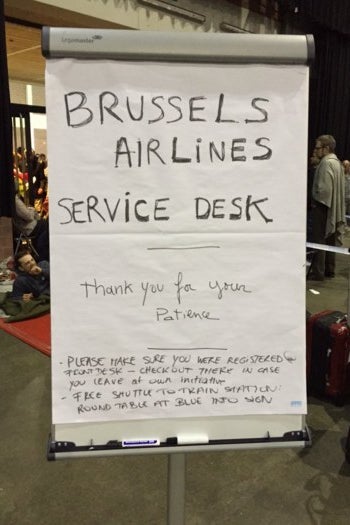
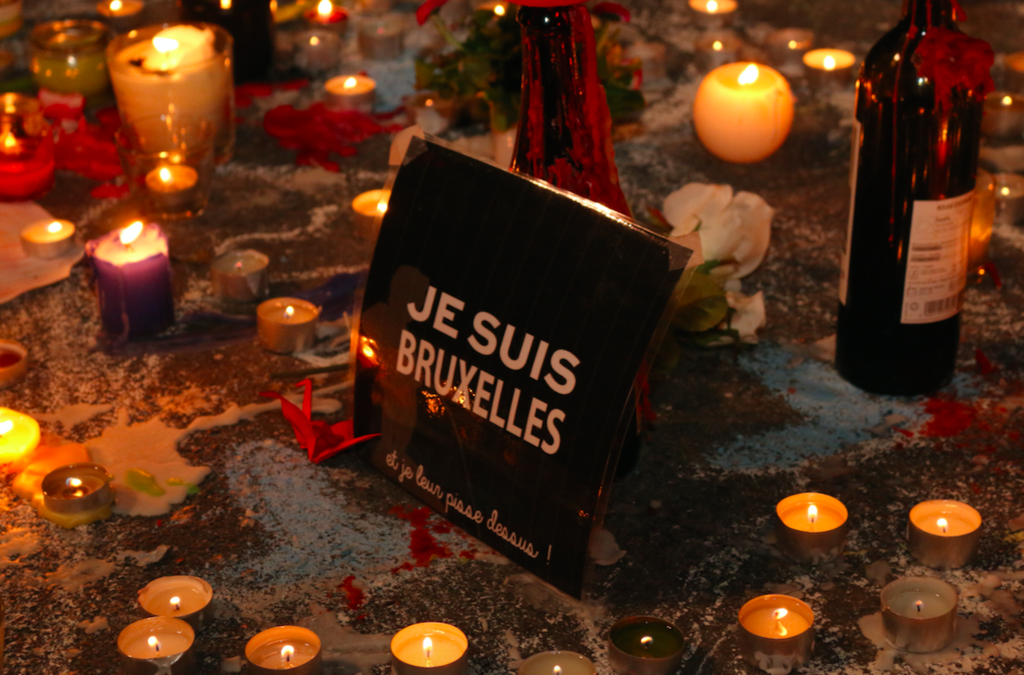
Back in the centre of Brussels, at the city's main train station, police officers and soldiers with machine guns patrolled the foyer areas as people were being made to go through stringent security checks, put in place at most public transport sites since the attacks.
A backdrop of roving army vehicles, blocked-off roads, and the ongoing manhunt for the attacker who escaped contrasted uncomfortably with a population that has responded to the bombings by gathering in the heart of the city, undeterred by terror warnings, to honour the victims and show Brussels would not give in to fear.
For the last two nights, lines of candles stood in Place de la Bourse, decorated by children's drawings and "Ju Suis Bruxelles" signs. The vigil for the victims beckoned a wide range of locals: men gathered to talk with friends while swigging on beer cans, young students played music on speakers while holding handmade signs, and families wandered around to look at the messages of hope written on the ground with chalk.
Walking through the crowds at Place de la Bourse – an area that is usually dominated by heavy streams of cars, but now cornered off by police barriers – the mood was defiant. While the fear of further attacks played on the mind of some in the crowd, many said that feeling was overridden by one of pride in their small, but powerful, city.
"I want people to know Belgium is united," Thibault, a 22-year-old student, said as he draped the national flag over his shoulders. "Yes, we were attacked, but I am proud of us, as people, especially with how we've been since the bombs. Yes, I feel scared, but normally, in this city, I feel safe."
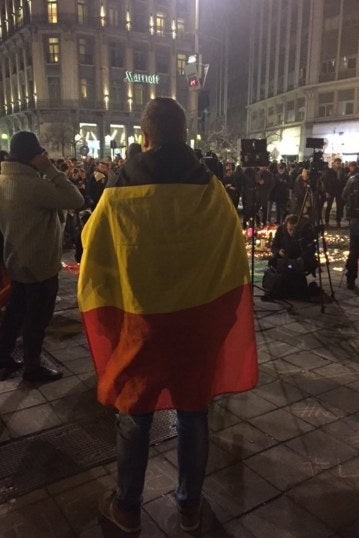
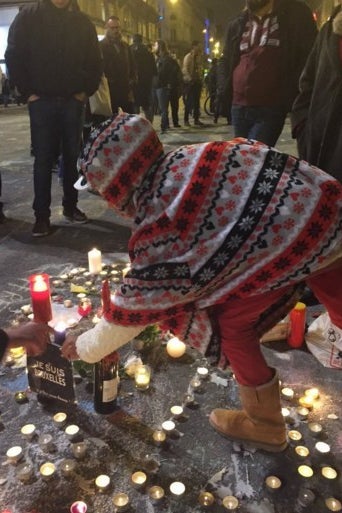
Belgium has been on high alert since the terror attacks in Paris four months ago, with the threat heightened last week following the arrest of Salah Abdeslam, the final suspect in the Paris attacks. Whether police were "prepared" was a common topic of conversation among the locals in Belgium, with the attacks prompting many locals to question whether Belgian authorities fully realised the potential threat the city faced, and beyond that, a concern that a threat of a terror could lead to a significant shift in their political landscape.
"People have been watching us here in Brussels closely since Paris," Aili Maruyama, a 22-year-old studying in Ghent, said as she sat on the steps of Place de la Bourse on a visit to Brussels to visit her girlfriend. "I don't think it's just the terrorists who see this as their victory, but I think the extreme right parties have won with it, too, because they can say, 'Look what happened, that's what we were talking about, see.' Now, these far right populist groups are coming like mushrooms from out of the ground."
As the night drew to an end, several people remained standing in the cold, hovering around candlelight. It was now quiet enough for some locals to take a proper photo of the vigil display on their phones without being knocked by rows of mourners. Balloons were tied to nearby trees, some deflated, in the colours black, yellow, and red.
With a spate of attacks now on their doorstep, locals are now questioning what can be done to ensure their country avoids being numbed into a state of fear, while also accepting that it may be difficult to rebuild its resilient nature that has taken a heavy knock within the last two days.
"We can't say it won't happen again, but you can't place police and an army everywhere on the streets either," Maruyama said. "And now, the fact it's happened, things will be different. I think these attacks will change everything from now on."
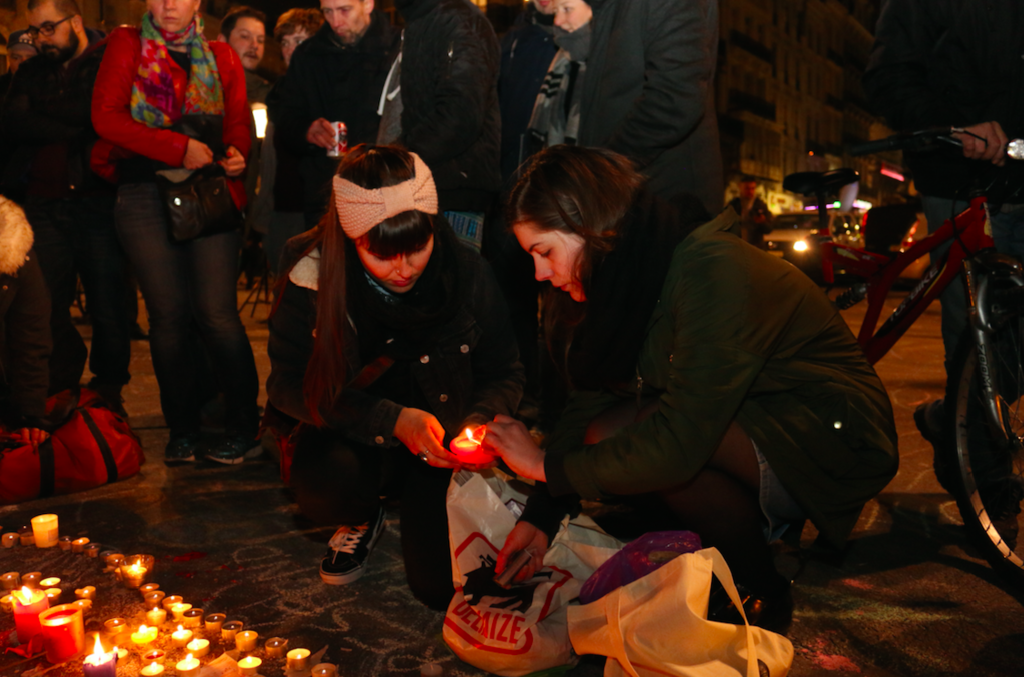
UPDATE
Since the airport attack on Tuesday, around 500 stranded passengers have been stranded at a warehouse in Leuven, 23km to the east. But on Thursday, they were finally able to leave as the operation began to transfer them to Amsterdam by bus.
Jet Airways – which was responsible for the majority of remaining stranded people as it had four planes arrive in Brussels on Tuesday morning, from Newark, Toronto, Mumbai, and Delhi – confirmed it was shuttling stranded travelers on 15 buses from Brussels to Schiphol airport in Amsterdam.
A statement from the airline said: “Our guests are currently on their way from Brussels to Amsterdam by road transport. They are being accompanied by Jet Airways staff. The airline has made hotel arrangements in Amsterdam for their overnight stay, before they continue onward journey to their destination.”
Passengers who survived the terror attacks in the airport were relieved to be finally en route home after a turbulent few days.
“After being in a freezing warehouse with not enough food for everyone I am finally home with my dad,” Malua Rixen, one of the stranded passengers, told BuzzFeed News. “Dad and I are safe – he was also so lucky as he was at the metro station where the bomb went off just ten minutes before, as his office is right above the station. But I can’t complain, I thank God we are okay.”
